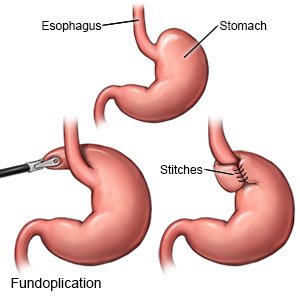Fundoplication in Adults
Medically reviewed by Drugs.com. Last updated on Aug 4, 2025.
Fundoplication is surgery to treat gastroesophageal reflux disease (GERD). During this surgery, the top part of your stomach is wrapped around the lower part of your esophagus. This prevents stomach acid from moving up into your esophagus.
 |
DISCHARGE INSTRUCTIONS:
Call your local emergency number (911 in the US) if:
- You have trouble breathing, chest pain, or a fast heart beat.
Seek care immediately if:
- You have a fever or chills, stomach pain, nausea, or vomiting.
- You are bleeding.
- You have blood in your stools (may be bright red or black).
Call your doctor if:
- You have pus or redness around your incision.
- You are unable to eat or drink.
- Your stomach is bloated.
- You have questions or concerns about your condition or care.
Related medications
Medicines:
You may need any of the following:
- Antibiotics help treat or prevent an infection caused by bacteria.
- Prescription pain medicine may be given. Ask your healthcare provider how to take this medicine safely. Some prescription pain medicines contain acetaminophen. Do not take other medicines that contain acetaminophen without talking to your healthcare provider. Too much acetaminophen may cause liver damage. Prescription pain medicine may cause constipation. Ask your healthcare provider how to prevent or treat constipation.
- Take your medicine as directed. Contact your healthcare provider if you think your medicine is not helping or if you have side effects. Tell your provider if you are allergic to any medicine. Keep a list of the medicines, vitamins, and herbs you take. Include the amounts, and when and why you take them. Bring the list or the pill bottles to follow-up visits. Carry your medicine list with you in case of an emergency.
Self-care:
- Slowly start to eat soft foods as directed. Ask your healthcare provider when you can resume your usual diet.
- Return to daily activities and exercise as directed. Slowly start to do more each day.
Wound care:
Keep your wounds clean and dry. When you are allowed to bathe or shower carefully wash your incisions with soap and water. Dry the area gently. Put on a new, clean bandage if directed.
Follow up with your doctor as directed:
Write down your questions so you remember to ask them during your visits.
© Copyright Merative 2025 Information is for End User's use only and may not be sold, redistributed or otherwise used for commercial purposes.
The above information is an educational aid only. It is not intended as medical advice for individual conditions or treatments. Talk to your doctor, nurse or pharmacist before following any medical regimen to see if it is safe and effective for you.
Further information
Always consult your healthcare provider to ensure the information displayed on this page applies to your personal circumstances.
